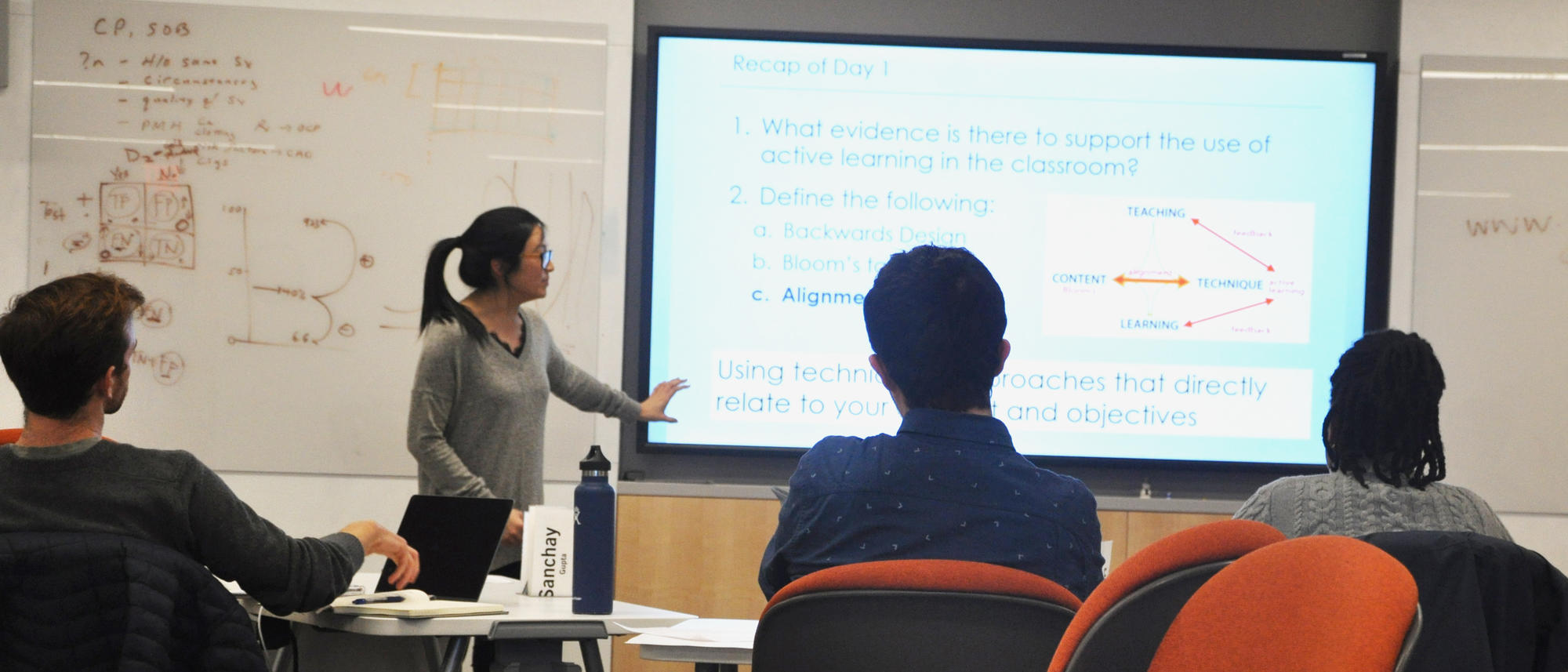
Quarter Courses in Teaching and Learning
Curriculum Fellows support a diverse set of courses across the medical campus and beyond. These include the Biological and Biomedical Science (BBS) program's core courses and electives in multiple departments. In addition, the CFP supports its own courses designed to provide opportunities for students interested in teaching to learn and employ the theory and practice of evidence-based teaching and learning strategies. Teaching 100 and Teaching 101 are complementary courses open for credit to all eligible Harvard students but frequently audited by postdocs seeking pedagogical training. BBS301 is specifically designed to train TAs in the BBS core courses. Each of these classes is developed and taught by Curriculum Fellows and the Co-Director. Complete descriptions of the CFP's three principle course offerings are found below.
CB306qc - Teaching 100: The Theory and Science of Teaching
This is a small, discussion-based class that focuses on the connections between the science of learning and pedagogical best practices. Students apply this material to the development of a syllabus that integrates concepts including interleaving, spaced retrieval, feedback and assessment. The course is developed and taught by the Co-Director of the Curriculum Fellows Program and a curriculum fellow and meets for a total of 16 contact hours.
Gen302qc – Teaching 101: Bringing Effective Teaching Practices to Your Classroom
This course focuses specifically on the practical application of pedagogical best practices to the development and deployment of effective lessons. Topics include backwards design, active learning, assessment, feedback and classroom presence. Students apply these concepts to the development and presentation of one lesson designed for a large class and another tailored to a smaller class. The course is typically team-taught by two current curriculum fellows and meets for a total of 18 contact hours.
BBS 301 - Teaching Practicum
This course is intended for teaching assistants who are currently teaching in one of the BBS Core Courses. The goals of this embedded course are two-fold: 1) to better prepare teaching assistants for the specific course that they are working on and 2) to teach skills for leading discussion sections, grading, formats for delivering educational content, and elements of course design to graduate students and postdocs interested in teaching. This course will help the Core Courses attract the graduate student TAs most committed to teaching. The course will prepare them to be the best possible teaching assistants while also helping them develop skills that will serve them in their further careers as academicians and science communicators. By awarding them credit, we are not only recognizing the extra work that they are doing throughout the semester for the embedded course itself, but we are providing an incentive for students to choose to TA in the Core Courses, which is one of the most rigorous outlets for TA credit at HMS. This opportunity will only be offered in the approved Core Courses, with a Curriculum Fellow directing the TA-embedded course.
MedSci 312qc - Longwood Medical Area TA Training
Building on the success of BBS301, this course expands the opportunities for pedagogical and practical training to Harvard graduate students currently acting as TAs in Curriculum Fellow-serviced courses. This unique course format begins with a short series of classroom-based sessions that immerse the TA in the expectations and requirements of working as a teaching assistant and then move on to the ways evidence-based teaching practices can inform their work. Students then continue to work with a Curriculum Fellow for the duration of their TA position, using the classroom content as the foundation for continued development, training and self-reflection.
Other Courses
HMS Curriculum fellows are frequent collaborators in the development and deployment of two novel course types: nanocourses and bootcamps.
Nanocourses are short courses that typically meet for a total of 6 hours over two days. These 'rapid-response' classes are developed to fill perceived gaps in the larger curriculum or to address developing topics relevant to the HMS community. Nanocourses are an opportunity for HMS faculty to reach students when it might be impossible or impractical to mount a semester-long course. They also represent a chance for Harvard graduate students to continue learning outside the boundaries of their typical courses. The first session of a nanocourse is typically an overview of the topic and is open to the wider Harvard community. The second session is typically reserved for students and is a hands-on, active exploration that dives deeper into the topic. Participants are often encouraged to consider how the topic may apply to their own work. Harvard graduate students are able to bundle multiple nanocourses together to receive course credit.
Bootcamps are intensive courses that typically meet every day for 1-2 weeks during the January or Summer terms. Typically, bootcamps focus on the aquisition of practical skills or hands-on exploration of a diverse field. Because they meet for many hours on consecutive days, bootcamp courses are able to thoroughly examine a topic or very effectively teach desired skills.

